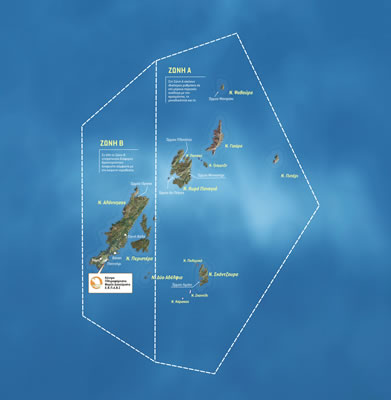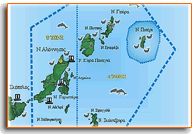The N.M.P.A.N.S. forms a unique combination of terrestrial and aquatic areas that create an important ecosystem with high biodiversity and archaeological/historical significance. The legislation of the establishment and operation of the Park aims to protect and preserve rare species and their habitats, cultural heritage as well as the development of the region through the sustainable management of natural resources.
The legislation governing the Park, which includes the regulatory measures and the general management framework of the area, is the joint Ministerial Decision No. 621/23537/2003.
The basic philosophy of organizing of the Park consists of its division into two main protected zones (A and B).

Zone A
Zone A is generally strictly protected and in some areas, based on the urgency of conservation, uniqueness and wildness of plant and animal life, specific measures are in force. In order to enter Zone A, it is necessary to obtain a special permission from the Management Body of N.M.P.A.N.S. Hunting is forbidden and there are special restrictions on professional fishing (coastal and middle fishing). There are also regulations for sport fishing, and in the entire area of the Marine Park is prohibited free camping, use of fire, even on the beach, as well as scuba diving by using spear gun. In the areas, where the access of yachts and professional tourist vessels is allowed, anchoring, swimming, observation of fauna and flora, photography, video recording and visit to cultural monuments are permitted. Additionally, in some areas spending the night on boat is allowed.
Zone B
Zone B includes inhabited areas with a lower protection level.
In Zone B, there are no special regulations for the visitor, except for the banning of free camping, use of fire and, in some areas, the limit of the speed of the boats. There are also specific measures for sport and professional middle fishing, others than those according to the National Legislation.
The plan of the Management Body will initially focus on:
- The protection of the Mediterranean monk seal and the habitats of other rare and threatened species.
- The protection, conservation and management of wildlife, natural landscapes, cultural heritage and fisheries resources.
- Providing a wide range of opportunities within the Marine Park, not only for the residents of Alonissos but also for the global community, always in line with the effective management and protection of the natural environment and cultural heritage.
- The effective management of the impact of human activities with the aim of preserving and restoring the natural ecosystem and cultural heritage.
- The surveillance and guarding of the area.
- The environmental education, information and public awareness, providing easily accessible information and educational material in a comprehensible form.
- The promotion of volunteering.
- The environmental education and training through the dissemination of research results on marine biodiversity.
- The preparation and implementation of an integrated and scientifically documented Management Plan.

The National Marine Park of Alonissos Northern Sporades was the first marine park established in Greece and currently the largest protected marine area in Europe. The efforts to protect this area began in the early 1970s. In 1986, the Prefecture of Magnisia signed the first resolution aiming to the protection of the Mediterranean monk seal (Monachus monachus) and its natural habitat.
These efforts were followed by a series of ministerial decisions on the protection of the local nature reserve. In May 1992, the area was finally declared as “National Marine Park” by presidential Decree. Finally, in June 2003, a Joint Ministerial Decision introduced the management framework for the region and created the Management Body, which becomes responsible for the preparation and implementation of the Management Plan of N.M.P.A.N.S.
The Governing Council of the Management Body of N.M.P.A.N.S. is composed of ten (10) members, who represent national, regional and local authorities, local professional associations and non -governmental environmental organizations. In 2010, Professor Stefanos Paraskevopoulos, University of Thessaly, Department of Special Education, was appointed Chairman of the Council.
Funding for the Management Body has been secured by the Operational Program “Environment” (EPPER). In May 2007, for the first time, 11 properly trained scientists and technical staff were hired, registered in Alonissos, for the implementation of protection and research programs, as well as public awareness and sensitization campaigns. A five-year management plan was also in course of preparation.
The National Marine Park of Alonissos Northern Sporades is member of the MedPAN (Network of Marine Protected Areas in the Mediterranean).
